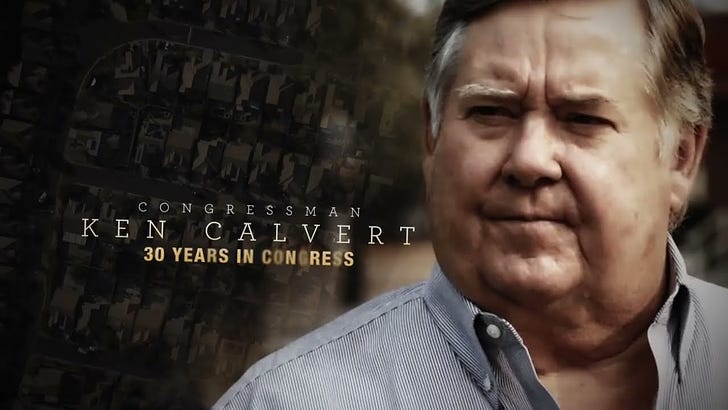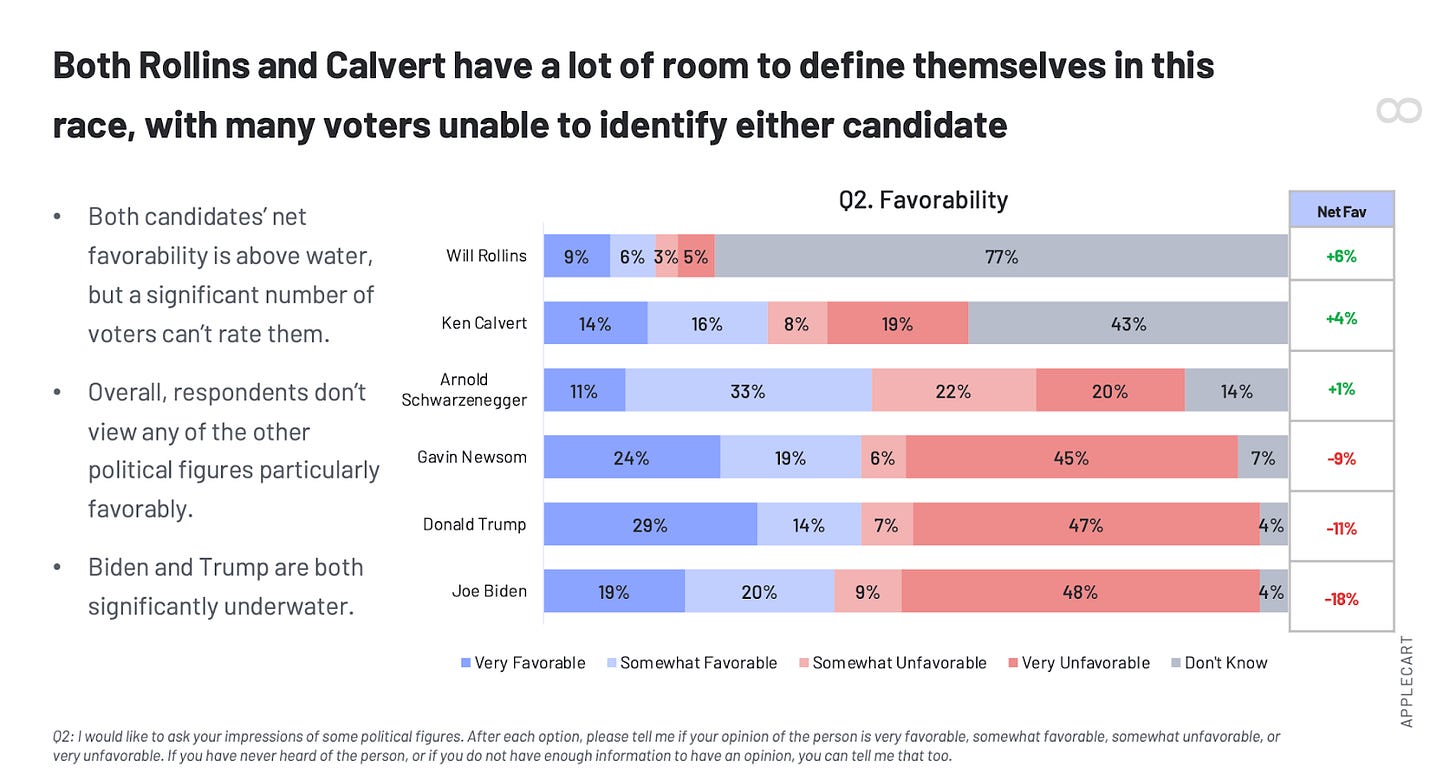Morning Ken
As seen on MSNBC: the villain, the hero, and the message to demonstrate a better way forward for Democrats.
Did you catch WelcomePAC polling data on MSNBC last week?
WelcomePAC data partner Applecart joined Morning Joe on Wednesday to highlight how Democrats must reallocate resources to districts like CA-41, where ex-Schwarzenegger aide Will Rollins has a path to beating a longtime GOP incumbent who has gotten a free pass for a decade:
The segment captured two related problems our team focuses on:
The inefficiency of the Democratic marketplace
The need for a dynamic big-tent faction of the Democratic Party that wins swing voters
As noted in the above clip, the absurdity of Democratic donors’ inefficiency is captured by the more than $10 million raised by Marjorie Taylor Greene’s Democratic opponent in a race that he is guaranteed to lose.
That one candidate has spent more on fundraising expenses alone (read: annoying you with texts) than national Democratic donors have sent to CA-41. As WelcomePAC co-founder Lauren Harper put it in CNN earlier this cycle, Democrats “get so caught up on the super villains” like MTG “that we don’t focus on the villains”.
The entire Democratic marketplace won’t be fixed in the next seven weeks. But case studies demonstrating the path forward are important. And that starts with where to focus.
Focusing on 30-year GOP incumbent Ken Calvert led WelcomePAC’s research team to understand the importance of the following features of CA-41:
Unknown Incumbent: Calvert is surprisingly little-known and undefined despite 30 years in Congress
With Baggage: While a Republican incumbent has the edge in CA-41 this cycle, Calvert’s history of corruption provides a clear path to victory
Challenger’s Secret Sauce: Swing voters love Rollins’ bipartisan background
That’s why swing voters throughout CA-41 just started to hear these contrast messages from WelcomePAC:
Focus on the Villains
Meet GOP Rep. Ken Calvert of CA-41, the most quietly endangered member of Congress (in either party):
Ken doesn’t just look like the caricature of a corrupt politician — he’s got the stats to back it up. He was named one of the most corrupt members of Congress, caught in his car with a prostitute, and so on.
As it turns out, voters don’t like that. WelcomePAC and Applecart’s summer survey of 1,620 likely voters in the newly-drawn CA-41 showed that Calvert’s history of corruption was even more potent than the abortion messages that are haunting Republicans around the country:
These effects may seem larger than would be expected from a simple message against an established, 30-year incumbent. But it turns out that it isn’t just national Democrats who are meeting Calvert for the first time — his constituents do not know him either:
Why aren’t national Democrats familiar with Calvert? He hasn’t faced a credible challenge by a Democrat since Blackberry’s market share outpaced the iPhone. In fact, until WelcomePAC’s March poll with Tulchin Research, there had been no public polling of Calvert’s district in more than a decade.
Over the last ten years, rapid population shifts have significantly changed the makeup of Calvert’s district, but “The Democrats” have not mounted a serious challenge — even in the Trump era. Calvert’s 2020 challenger barely raised any money and ran on a far-left platform ill-fitted for a district that skews center-right.
He still finished with 43% of the vote.
Enter the Hero (and Redistricting)
Will Rollins is an especially strong candidate for CA-41. A federal prosecutor who had taken on terrorists, he cut his teeth serving as an aide to the state’s Republican governor Arnold Schwarzenegger. In other words, he had the bipartisan appeal necessary to win crossover voters in what was then a solidly right-of-center (R+7-rated) district.


Then in December’s redistricting frenzy, the independent redistricting process made CA-41 a genuine toss-up with Trump at 50% of the 2020 vote. The new map also included the city of Palm Springs, whose large community of LGBTQ voters consolidated behind Rollins against Calvert’s track record of opposing gay rights.
With these new developments having put the district within reach for Rollins, WelcomePAC’s research showed the path to winning over the critical swing voters who will decide November’s outcome. These voters were uniquely excited about the Democratic nominee’s distinct bipartisan background and approach:
Comparative Advantages
There are at least six types of actors in a congressional race:
Incumbent candidate campaign (e.g. Calvert’s campaign)
GOP interest groups (e.g. Club for Growth)
GOP party groups (e.g. National Republican Congressional Committee, which have distinct entities that can coordinate with or can spend unlimited amounts supporting candidates)
Challenger campaign committee
Democratic interest groups
Democratic party groups
The GOP will likely help Calvert more than “The Democrats” will help Rollins. Incumbents hold an advantage through incumbency, not just with voters but because their formal party groups skew towards incumbents. Parties do not just seek to maximize seats, as resources flow towards internal incentives. Some are raw political (legislative leadership must be perceived as prioritizing member protection), some financial (Calvert has literally been paying dues money for three decades), and some psychological (in addition to deeper personal relationships, loss aversion likely also plays a role in investing disproportionately defending incumbents than in picking up new seats).
The GOP pays a higher opportunity cost for investments: every dollar national GOP groups re-allocate to CA-41 is a dollar that will not go to a different swing district - something they have not had to do for a decade.
Campaigns have massive financial advantage in TV spending - but not other paid communications: while the price of mail, texts, online TV, phone calls, and most other direct paid communication with voters is comparable between candidate campaigns and other groups, the cost of TV is not. Federal regulations guarantee political candidates the “lowest unit rate” when it comes to TV, radio, and cable spending within 45 days of the primary election and 60-days prior of the general. As a result, TV can cost as much as eight times more for outside groups than it does for the candidates themselves (depending on the media market).
This means that candidate campaigns have a significant comparative advantage in buying TV. When it comes to Rollins, for example, the campaign spent a little more than $200,000 on TV and a little less than $200,000 on mail in advance of the June primary. An outside group could have spent $200,000 on mail and voters would have received roughly the same number of mail pieces — but if that group had spent the same amount on TV, it would have reached far fewer voters than the campaign.
Timing advantages: Early spending is required to define Calvert’s unique weakness (corruption) and Rollins’ strengths in this low-information environment. However, most national party group spending comes very late in the campaign - and only if the race is close. For challengers, their comparative timing advantage is spending early to maximize the chances of moving two audiences: the swing voters needed to make the race close, and the national groups waiting until late to make resource allocation decisions.
Most Valuable Persuadables
Applecart’s analysis on MSNBC not only highlighted CA-41 as a high-value investment for Democrats but also showed that swing voters hungry for bipartisanship are the most valuable voters in this fall’s contest.
Party registration in CA-41 is roughly equal at 36.5% Democrat and 36.4% Republican. The remaining registered voters are independents (“No Party Preference” in California) — and many are up for grabs.
Most swing voters are clearly identifiable due to party enrollment. They don’t like corruption. They do like bipartisan leaders. Launching at $100,000/week across online TV and mail, WelcomePAC’s new ad buy will educate swing voters and enable them to participate more fully in our democracy.
In a state without competitive Senate or gubernatorial elections, CA-41 voters have been denied any semblance of democracy for at least a decade.
That can change this year — and show the rest of the country how to save it.








